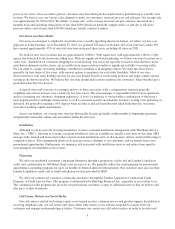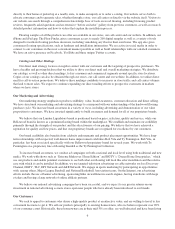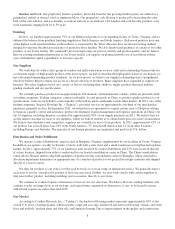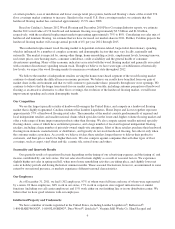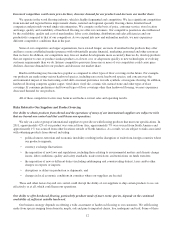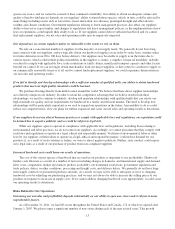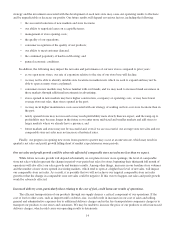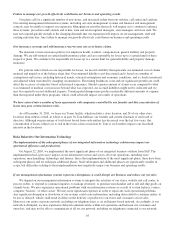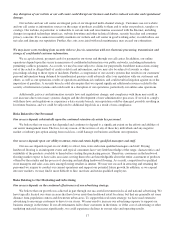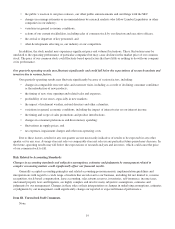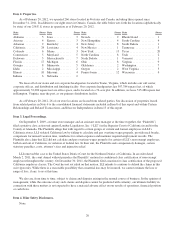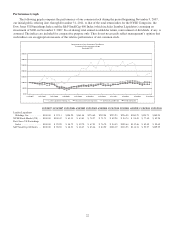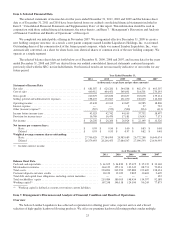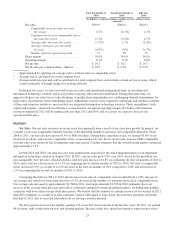Lumber Liquidators 2011 Annual Report Download - page 21
Download and view the complete annual report
Please find page 21 of the 2011 Lumber Liquidators annual report below. You can navigate through the pages in the report by either clicking on the pages listed below, or by using the keyword search tool below to find specific information within the annual report.Damage, destruction or disruption of our Toano or Hampton facilities could significantly impact our operations and
impede our ability to finish and distribute our products.
Our Toano facility serves as our corporate headquarters and, among other things, houses our primary computer systems,
which control our management information and inventory management systems. In addition, we currently finish
approximately 79% of all Bellawood products as well as small quantities of certain other products there. In 2011, Bellawood
flooring accounted for approximately 16% of our net sales. Further, the Toano facility, along with our facilities in Hampton,
serves as our distribution centers. If the Toano facility, the Hampton facilities or our inventory held in those locations were
damaged or destroyed by fire, wood infestation or other causes, our entire finishing and/or distribution processes would be
disrupted, which could cause significant lost production and delays in delivery. This could impede our ability to stock our
stores and deliver products to our customers, and cause our net sales and operating results to deteriorate.
Federal, provincial, state or local laws and regulations, or our failure to comply with such laws and regulations, could
increase our expenses, restrict our ability to conduct our business and expose us to legal risks.
We are subject to a wide range of general and industry-specific laws and regulations imposed by federal, provincial,
state and local authorities in the countries in which we operate including those related to customs, foreign operations (such as
the Foreign Corrupt Practices Act), truth-in-advertising, consumer protection, privacy, zoning and occupancy matters as well
as the operation of retail stores and warehouse, production and distribution facilities. In addition, various federal, provincial
and state laws govern our relationship with and other matters pertaining to our employees, including wage and hour laws,
requirements to provide meal and rest periods or other benefits, family leave mandates, requirements regarding working
conditions and accommodations to certain employees, citizenship or work authorization and related requirements, insurance
and workers’ compensation rules and anti-discrimination laws. If we fail to comply with these laws and regulations, we could
be subject to legal risk, our operations could be impacted negatively and our reputation could be damaged. Likewise, if such
laws and regulations should change, our costs of compliance may increase, thereby impacting our results and hurting our
profitability.
Certain portions of our operations are subject to laws and regulations governing the use, storage, handling, generation,
treatment, emission, release, discharge and disposal of certain hazardous materials and wastes, the remediation of
contaminated soil and groundwater and the health and safety of employees. If we are unable to extend or renew a material
approval, license or permit required by such laws, or if there is a delay in renewing any material approval, license or permit,
that may cause our net sales and operating results to deteriorate or otherwise harm our business.
With regard to our products, we may spend significant time and resources to ensure compliance with applicable
advertising, importation, exportation, environmental, health and safety laws and regulations. If we should violate these laws
and regulations, we could experience delays in shipments of our goods, be subject to fines or penalties, or suffer reputational
harm, which could reduce demand for our merchandise and hurt our business and results of operations. Further, if such laws
and regulations should change, we may experience increased costs or incur decreased efficiency in order to adhere to the new
standards.
The operation of stores in Canada may present increased risks due to our limited familiarity with that market.
In 2011, we opened seven store locations in Canada. As a result of our limited experience in the Canadian market, these
stores may be less successful than we expect. Additionally, greater investments in advertising and promotional activity may
be required to build brand awareness in that market. Furthermore, we have limited experience with the legal and regulatory
environments and market practices outside of the United States and cannot guarantee that we will be able to operate in the
Canadian market in a manner and with the results similar to our U.S. stores. We may also incur increased costs in complying
with applicable Canadian laws and regulations as they pertain to both our products and our operations.
The establishment of our Representative Office in China may present increased legal and operational risks.
In September 2011, we acquired certain assets of Sequoia relating to Sequoia’s quality control and assurance, product
development and logistics operations in China. In connection with the transaction, we established a representative office in
Shanghai, China and assumed direct control of sourcing previously managed by Sequoia in China. Prior to the close of the
transaction, Sequoia provided services on a significant portion of our purchases from Asia.
We have limited experience with the legal and regulatory practices and requirements in China. As a result, we may incur
costs in complying with applicable Chinese laws and regulations that exceed our expectations. Further, if we fail to comply
with applicable laws and regulations, we could be subject to legal risk.
15


